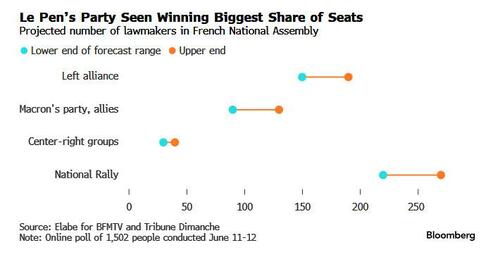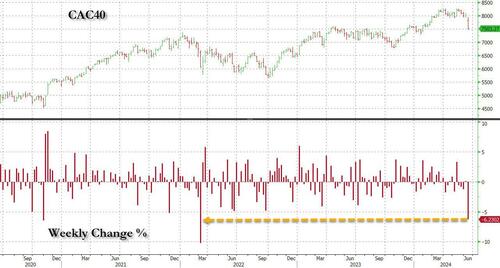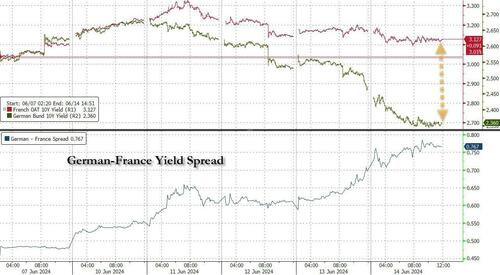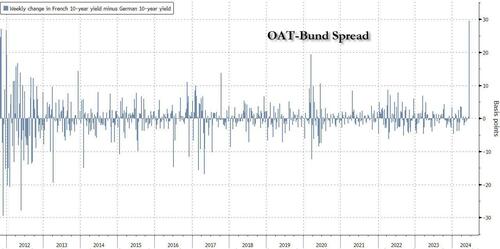It wasn't supposed to go like this: as discussed earlier today, Macron's gamble to dissolve parliament and call a two-round snap election on June 30 and July 7 was supposed to boost morale, "circle the troops" and push back against the "extremism" of Marine Le Pen's "far right" avalanche which absolutely crushed Macron's party in last weekend's European Parliament elections. Instead, it has opened the proverbial Pandora's Box and even sparked speculation that Frexit - and even the broader collapse of the Eurozone which lay dormant for much of the past decade - may again be looming.
The reason behind this catastrophic sequence of events which will culminate in less than a month with impromptu French elections is, as always, sheer hubris, in this case that of President Emmanuel Macron and his centrist alliance who according to the FT, "could be facing a wipeout in snap parliamentary elections after France’s leftwing parties struck a unity pact."
According to two new studies for Le Figaro and BFM TV, only around 40 of Macron’s MPs would qualify for the second round vote on July 7, in run-off races that would predominantly be fought between candidates fielded by the far right or the leftwing bloc for the 589-strong assembly.
The findings, as we noted earlier, confirm that Macron’s dramatic gamble to dissolve parliament and hold early elections in the hope of stopping the rise of the far-right Rassemblement National party is about to backfire spectacularly, and also underscore that the outcome of the two-round vote on June 30 and July 7 could be determined by the left.
As Bloomberg reports, four otherwise fractious left-wing parties sealed an alliance on Thursday to join forces in the upcoming legislative election, with polls showing it can win the second-biggest bloc behind Marine Le Pen’s National Rally. The alliance - which was endorsed by France's former socialist president François Hollande - will have to overcome significant divisions between its members, notably over military support for Ukraine and Melenchon’s refusal to consider Hamas a terrorist organization.
“There was an expectation of union expressed,” the Socialist Party said in a statement late Thursday. “It is sealed.”
The accord did not specify who would be their candidate for prime minister but Jean-Luc Mélenchon, leader of the far-left France Insoumise (France Unbowed, LFI) party and a polarizing figure in French politics, hinted earlier on Thursday that he wanted the job. LFI secured the largest proportion of candidates on the joint list with the centre-left, Socialists, Greens, and Communists. And yet, speaking in an interview on TF1 as the news broke Thursday, Hollande said comments made recently by Melenchon would exclude the far-left leader from serving in a government. The former Socialist president said he didn’t know the details of the agreement but it must be pro-European, in favor of France remaining in NATO, and call for peace in Gaza while recognizing the Hamas terror attack. He said it will also be necessary to have measures on housing and support for real incomes, while remaining credible.
“The essential thing is that unity was possible,” Hollande said. “A time comes when we have to move beyond our differences.”
Speaking earlier, the current Prime Minister Gabriel Attal said it was “shameful” that the Socialist Party — where he began his political career — had entered a pact with France Unbowed.
“I’m calling on left, social-democratic voters, and there are a lot of them, who don’t identify with the France Unbowed program to support our candidates,” Attal said.
In any event, the unexpected development is a huge blow to Macron: if the left parties had ran multiple candidates for each seat, Macron’s centrist alliance would have had better chances of piercing through to the second round. To qualify for a run-off, a candidate needs to have won the backing of 12.5% of registered voters. With the alliance now in place, Macron’s chances of emerging from the elections with a firmer grip on government and centrist forces in parliament are now officially gone. His campaign had made overtures to the Socialists, whose government Macron served in during the presidency of Francois Hollande.
By extrapolating results from last week’s European parliamentary election to the upcoming first round in the French legislative poll, Le Pen's RN would come first in 362 seats and the left would come top in 211, according to Le Figaro’s calculations.
Some analysts cautioned against extrapolating from European parliament elections, which take place in a single round according to proportional representation. They often have low turnout and are used as a protest vote against the government.
In an attempt to prevent all out panic that France will be divided between the "far-left" and "far-right" with centrists trampled, Mathieu Gallard, a pollster at Ipsos, said predicting seat share at this stage was “just a matter of intuition”. Candidates have not yet been selected and incumbent MPs often command considerable local loyalty. Margins of error for voting intentions across two rounds, the close contests in many constituencies and doubts over turnout made the “outcome highly uncertain at this stage”.
Still, forecasts add to a series of gloomy surveys for Macron’s camp this week, suggesting he could easily lose at least half of his 250 seats in the assembly.
Asked about the difficult poll numbers, an adviser to Macron’s alliance said: “There is a narrow path forward, and we’ll see how dynamics shift in the coming days. It is hard but not impossible.”
Turning from the left to the right, an Elabe poll for BFM and La Tribune Dimanche put the RN on 31% (with 4 for the rival party Reconquête), the leftwing alliance on 28%, and Macron’s centrist alliance on 18% while the centre-right Les Républicains on 6.5%.
Elabe projects the RN winning between 220 and 270 seats, the left 150-190 and Macron’s alliance 90-130, an unprecedented disaster for Macron, who despite his previous vows may have no choice but to resign. The center right would take 30-40.
It gets even worse for the European liberal, technocrat establishment: the polls suggest the mostly likely scenario is a hung parliament, but if the RN wins by a big margin, it will have a claim on the office of prime minister and the right to form a government.
France’s conservative and right-wing parties are struggling to forge a united front in the elections. The Republicans are locked in bitter infighting as most of the party’s senior members are trying to expel their president, Eric Ciotti, after he announced a pact with National Rally. He refuses to step down and is appealing at the Paris tribunal. And Marion Marechal, the vice president of the nationalist Reconquest party, was expelled late Wednesday, after she, too, sought to form a coalition with Le Pen, who is also her aunt.
While the French elections are still at least two weeks ago, French markets - both stock and bond - got destroyed this week: the CAC 40 index fell 2%, completing its worst week in nearly a year. Banks fell the most, with Societe Generale SA down 12% and BNP Paribas SA down 10% on the week.
But if stocks were hit, the bond market was absolutely crushed: French 10-year bond yields (OATs) over their German Bund counterparts, just jumped by a record this week as the two bonds diverged with a thud.
According to Bloomberg data, the OAT-bund spread widened 29bps this week to 77bps, the highest since 2017!
The prospect of the far-left getting a sway over policy has rattled investors in the past. When polls in 2017 showed the presidential election could end up as a head-to-head between Le Pen and Melenchon, French debt sold off sharply, quadrupling its premium over safer German peers in a matter of months. This time is even worse, with S&P downgrading the French credit rating from AA to AA- citing larger-than-expected deficits and political fragmentation as reasons for the downgrade.
OAT-bund spread widens by a record 29bps this week to 77bps, the most since 2017. That comes as polls show a left-leaning political alliance could win the second-biggest bloc behind Marine Le Pen’s far-right National Rally, pushing President Emmanuel Macron’s party into third place
And as goes France, so goes the rest of the Eurozone: peripheral debt was also hammered up in the rush to exit positions; Italian bonds yields reach the widest in four months versus German peers after the premium jumps the most since March 2023.
In the end, however, the biggest shock may be that - as we noted recently - Europe is about to discover that ever since the great sovereign debt crisis nothing has been fixed, and instead all the problems were merely shoved under the biggest debt pile in history.
*FRANCE-GERMANY 10-YEAR YIELD GAP SET FOR WIDEST SINCE 2017
— zerohedge (@zerohedge) June 13, 2024
market about to remember that NOTHING in Europe has been fixed, and everything was just swept under the most gigantic debt pile pic.twitter.com/tkTYju7gp5
And if Macron's gamble fails - as it now looks it will - and France is unable to maintain the cheerful if "Potemkin Village" status quo, it's all about to implode... which of course means the mother of all ECB intervention is on deck, because as TS Lombard's Dario Perkins sketched it out, the bigger the European crisis, the more powerful the central bank response, and the higher all risk assets will soar.
I could have made this prettier pic.twitter.com/ViLpIrf2uB
— Dario Perkins (@darioperkins) June 14, 2024
It wasn't supposed to go like this: as discussed earlier today, Macron's gamble to dissolve parliament and call a two-round snap election on June 30 and July 7 was supposed to boost morale, "circle the troops" and push back against the "extremism" of Marine Le Pen's "far right" avalanche which absolutely crushed Macron's party in last weekend's European Parliament elections. Instead, it has opened the proverbial Pandora's Box and even sparked speculation that Frexit - and even the broader collapse of the Eurozone which lay dormant for much of the past decade - may again be looming.
The reason behind this catastrophic sequence of events which will culminate in less than a month with impromptu French elections is, as always, sheer hubris, in this case that of President Emmanuel Macron and his centrist alliance who according to the FT, "could be facing a wipeout in snap parliamentary elections after France’s leftwing parties struck a unity pact."
According to two new studies for Le Figaro and BFM TV, only around 40 of Macron’s MPs would qualify for the second round vote on July 7, in run-off races that would predominantly be fought between candidates fielded by the far right or the leftwing bloc for the 589-strong assembly.
The findings, as we noted earlier, confirm that Macron’s dramatic gamble to dissolve parliament and hold early elections in the hope of stopping the rise of the far-right Rassemblement National party is about to backfire spectacularly, and also underscore that the outcome of the two-round vote on June 30 and July 7 could be determined by the left.
As Bloomberg reports, four otherwise fractious left-wing parties sealed an alliance on Thursday to join forces in the upcoming legislative election, with polls showing it can win the second-biggest bloc behind Marine Le Pen’s National Rally. The alliance - which was endorsed by France's former socialist president François Hollande - will have to overcome significant divisions between its members, notably over military support for Ukraine and Melenchon’s refusal to consider Hamas a terrorist organization.
“There was an expectation of union expressed,” the Socialist Party said in a statement late Thursday. “It is sealed.”
The accord did not specify who would be their candidate for prime minister but Jean-Luc Mélenchon, leader of the far-left France Insoumise (France Unbowed, LFI) party and a polarizing figure in French politics, hinted earlier on Thursday that he wanted the job. LFI secured the largest proportion of candidates on the joint list with the centre-left, Socialists, Greens, and Communists. And yet, speaking in an interview on TF1 as the news broke Thursday, Hollande said comments made recently by Melenchon would exclude the far-left leader from serving in a government. The former Socialist president said he didn’t know the details of the agreement but it must be pro-European, in favor of France remaining in NATO, and call for peace in Gaza while recognizing the Hamas terror attack. He said it will also be necessary to have measures on housing and support for real incomes, while remaining credible.
“The essential thing is that unity was possible,” Hollande said. “A time comes when we have to move beyond our differences.”
Speaking earlier, the current Prime Minister Gabriel Attal said it was “shameful” that the Socialist Party — where he began his political career — had entered a pact with France Unbowed.
“I’m calling on left, social-democratic voters, and there are a lot of them, who don’t identify with the France Unbowed program to support our candidates,” Attal said.
In any event, the unexpected development is a huge blow to Macron: if the left parties had ran multiple candidates for each seat, Macron’s centrist alliance would have had better chances of piercing through to the second round. To qualify for a run-off, a candidate needs to have won the backing of 12.5% of registered voters. With the alliance now in place, Macron’s chances of emerging from the elections with a firmer grip on government and centrist forces in parliament are now officially gone. His campaign had made overtures to the Socialists, whose government Macron served in during the presidency of Francois Hollande.
By extrapolating results from last week’s European parliamentary election to the upcoming first round in the French legislative poll, Le Pen's RN would come first in 362 seats and the left would come top in 211, according to Le Figaro’s calculations.
Some analysts cautioned against extrapolating from European parliament elections, which take place in a single round according to proportional representation. They often have low turnout and are used as a protest vote against the government.
In an attempt to prevent all out panic that France will be divided between the "far-left" and "far-right" with centrists trampled, Mathieu Gallard, a pollster at Ipsos, said predicting seat share at this stage was “just a matter of intuition”. Candidates have not yet been selected and incumbent MPs often command considerable local loyalty. Margins of error for voting intentions across two rounds, the close contests in many constituencies and doubts over turnout made the “outcome highly uncertain at this stage”.
Still, forecasts add to a series of gloomy surveys for Macron’s camp this week, suggesting he could easily lose at least half of his 250 seats in the assembly.
Asked about the difficult poll numbers, an adviser to Macron’s alliance said: “There is a narrow path forward, and we’ll see how dynamics shift in the coming days. It is hard but not impossible.”
Turning from the left to the right, an Elabe poll for BFM and La Tribune Dimanche put the RN on 31% (with 4 for the rival party Reconquête), the leftwing alliance on 28%, and Macron’s centrist alliance on 18% while the centre-right Les Républicains on 6.5%.
Elabe projects the RN winning between 220 and 270 seats, the left 150-190 and Macron’s alliance 90-130, an unprecedented disaster for Macron, who despite his previous vows may have no choice but to resign. The center right would take 30-40.
It gets even worse for the European liberal, technocrat establishment: the polls suggest the mostly likely scenario is a hung parliament, but if the RN wins by a big margin, it will have a claim on the office of prime minister and the right to form a government.
France’s conservative and right-wing parties are struggling to forge a united front in the elections. The Republicans are locked in bitter infighting as most of the party’s senior members are trying to expel their president, Eric Ciotti, after he announced a pact with National Rally. He refuses to step down and is appealing at the Paris tribunal. And Marion Marechal, the vice president of the nationalist Reconquest party, was expelled late Wednesday, after she, too, sought to form a coalition with Le Pen, who is also her aunt.
While the French elections are still at least two weeks ago, French markets - both stock and bond - got destroyed this week: the CAC 40 index fell 2%, completing its worst week in nearly a year. Banks fell the most, with Societe Generale SA down 12% and BNP Paribas SA down 10% on the week.
But if stocks were hit, the bond market was absolutely crushed: French 10-year bond yields (OATs) over their German Bund counterparts, just jumped by a record this week as the two bonds diverged with a thud.
According to Bloomberg data, the OAT-bund spread widened 29bps this week to 77bps, the highest since 2017!
The prospect of the far-left getting a sway over policy has rattled investors in the past. When polls in 2017 showed the presidential election could end up as a head-to-head between Le Pen and Melenchon, French debt sold off sharply, quadrupling its premium over safer German peers in a matter of months. This time is even worse, with S&P downgrading the French credit rating from AA to AA- citing larger-than-expected deficits and political fragmentation as reasons for the downgrade.
OAT-bund spread widens by a record 29bps this week to 77bps, the most since 2017. That comes as polls show a left-leaning political alliance could win the second-biggest bloc behind Marine Le Pen’s far-right National Rally, pushing President Emmanuel Macron’s party into third place
And as goes France, so goes the rest of the Eurozone: peripheral debt was also hammered up in the rush to exit positions; Italian bonds yields reach the widest in four months versus German peers after the premium jumps the most since March 2023.
In the end, however, the biggest shock may be that - as we noted recently - Europe is about to discover that ever since the great sovereign debt crisis nothing has been fixed, and instead all the problems were merely shoved under the biggest debt pile in history.
*FRANCE-GERMANY 10-YEAR YIELD GAP SET FOR WIDEST SINCE 2017
— zerohedge (@zerohedge) June 13, 2024
market about to remember that NOTHING in Europe has been fixed, and everything was just swept under the most gigantic debt pile pic.twitter.com/tkTYju7gp5
And if Macron's gamble fails - as it now looks it will - and France is unable to maintain the cheerful if "Potemkin Village" status quo, it's all about to implode... which of course means the mother of all ECB intervention is on deck, because as TS Lombard's Dario Perkins sketched it out, the bigger the European crisis, the more powerful the central bank response, and the higher all risk assets will soar.
I could have made this prettier pic.twitter.com/ViLpIrf2uB
— Dario Perkins (@darioperkins) June 14, 2024




